Heiltsuk and Haida women rising
Scroll down to continueStory by Emilee Gilpin
As an end-of-February sun rose to paint the sky shades of pink and purple, howling laughter and cheerful chatter meant something was stirring on the island of Haida Gwaii.
On an otherwise quiet Monday morning, the most popular café bistro in Skidegate, buzzed with energy. Most mornings are busy for Jags Beanstalk, whose slogan is: "bistro, beds, coffee, conversation." But today, it was unusually animated.
The first cohort of Heiltsuk women had arrived off the ferry in Skidegate, where they stopped for a coffee and a bite to eat, before driving north along the east side of the island, to Old Masset. They were on their way to the first ever Heiltsuk and Haida Women’s Dialogue Session.
The event was the third Women's Dialogue Session to be held in Haida Gwaii over the last year. The first session was for Haida women only, the second, for Haida and non-Haida women living in Haida Gwaii, and now this one for Heiltsuk and Haida women. The dialogue sessions were inspired by the BC Assembly of First Nations' women's dialogue session in Vancouver in March, 2017.
Feeling empowered by the dialogue session in March, Chief Administrative Officer of the Skidegate Band Council, Babs Stevens, said she wanted to host their own gathering of women in Haida Gwaii. Chief Councilor of the Heiltsuk Tribal Council, Marilyn Slett had overheard and said she wanted to participate. That conversation planted the seed for what would be one of the biggest gatherings of Heiltsuk and Haida women since the Peace Treaty signing in 2014/2015.
The sessions were supported by The Council of the Haida Nation, Old Masset Village Council, and the Skidegate Band Council and the last session had the support of the Heiltsuk Tribal Council.
The Haíłzaqv (Heiltsuk) and Haida Nations share a long history.
Treaty of Peace, Respect and Responsibility
Scroll down to continueThe Heiltsuk and Haida Nations share a history complicated by war, raids, intermarriage, and trade.
In the 1800s, understanding that it was a time of great change, when the need for solidarity had become too significant to ignore, Heiltsuk and Haida hereditary leaders decided to establish an oral Peace Treaty between the two Nations. The Nations agreed to exchange a number of songs to formalize the treaty, songs still sung today.
In 1997, leaders discussed a written form of the treaty, talks that continued until 2014. In 2014, the Haida Nation hosted a group of around 70 Heiltsuk representatives to formalize the Nation-to-Nation agreement, through the three-page Haida Heiltsuk Peace Treaty.
And in June of the following year, the Heiltsuk hosted the Haida to finalize the written treaty.
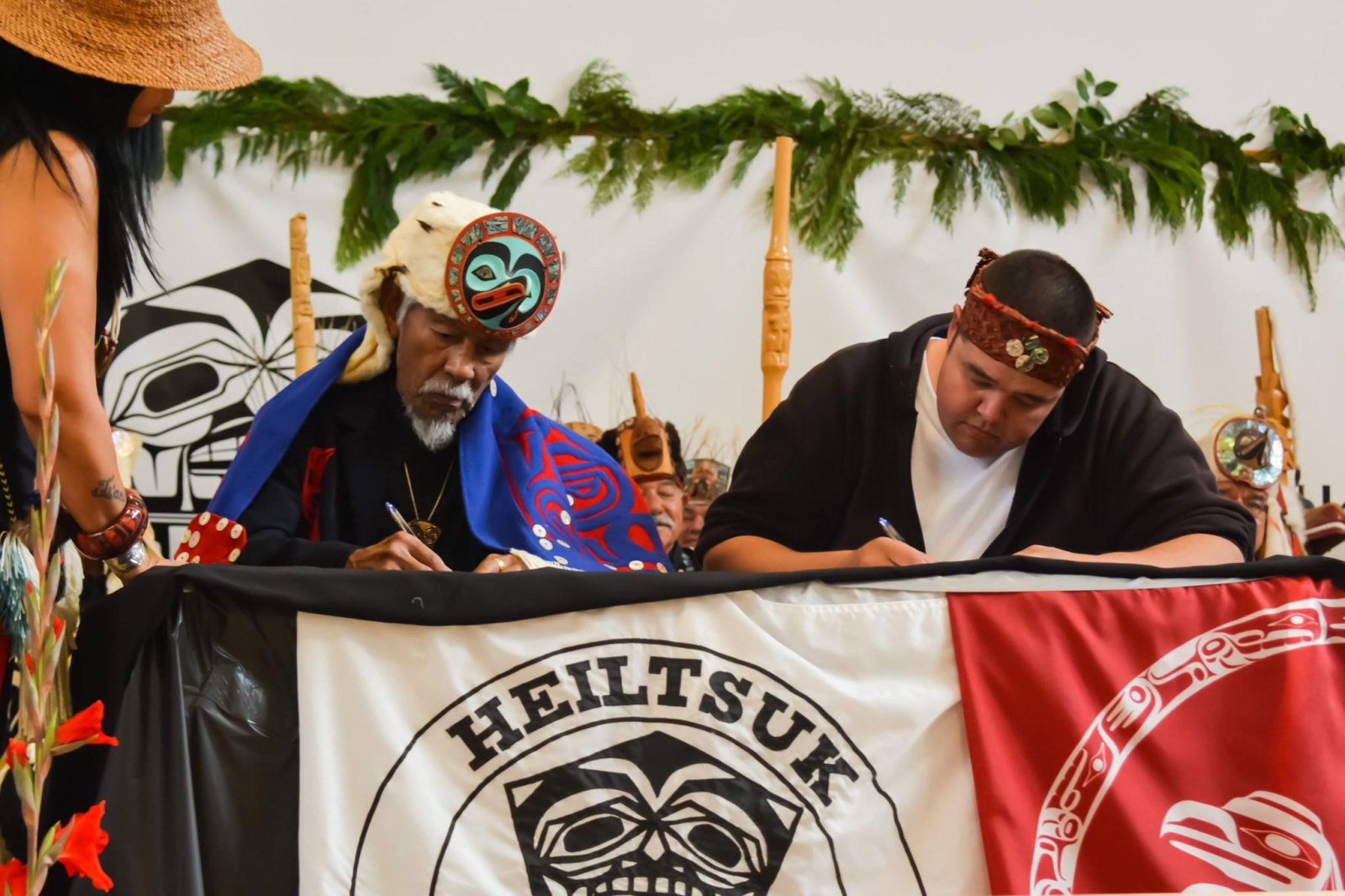
Haida Chief Gidansda, the late Percy Williams and William Housty (Heiltsuk), signing the treaty. September 2014. Photo by Mary Helmer.
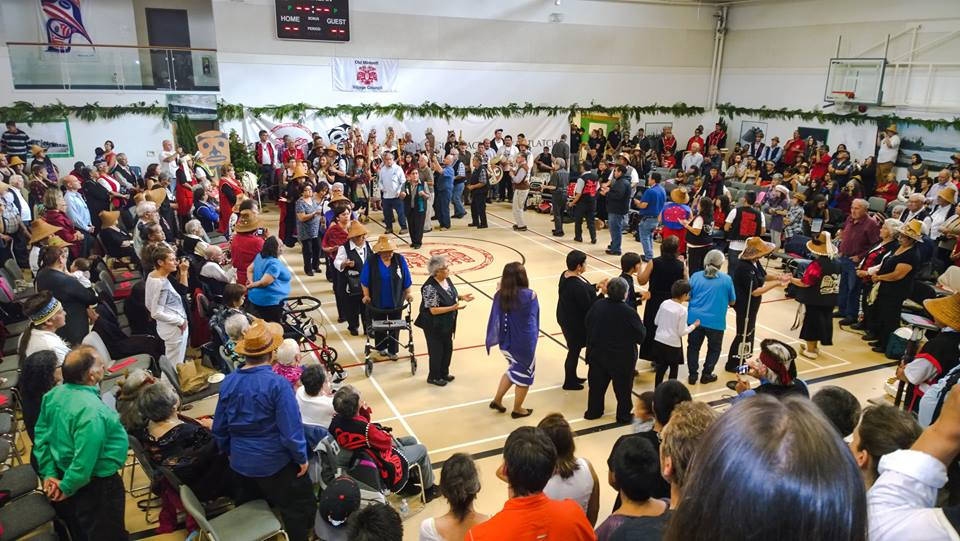
During the Peace Treaty signing potlatch at the community hall in Old Masset, Haida Gwaii. September, 2014. Photo by Mary Helmer.
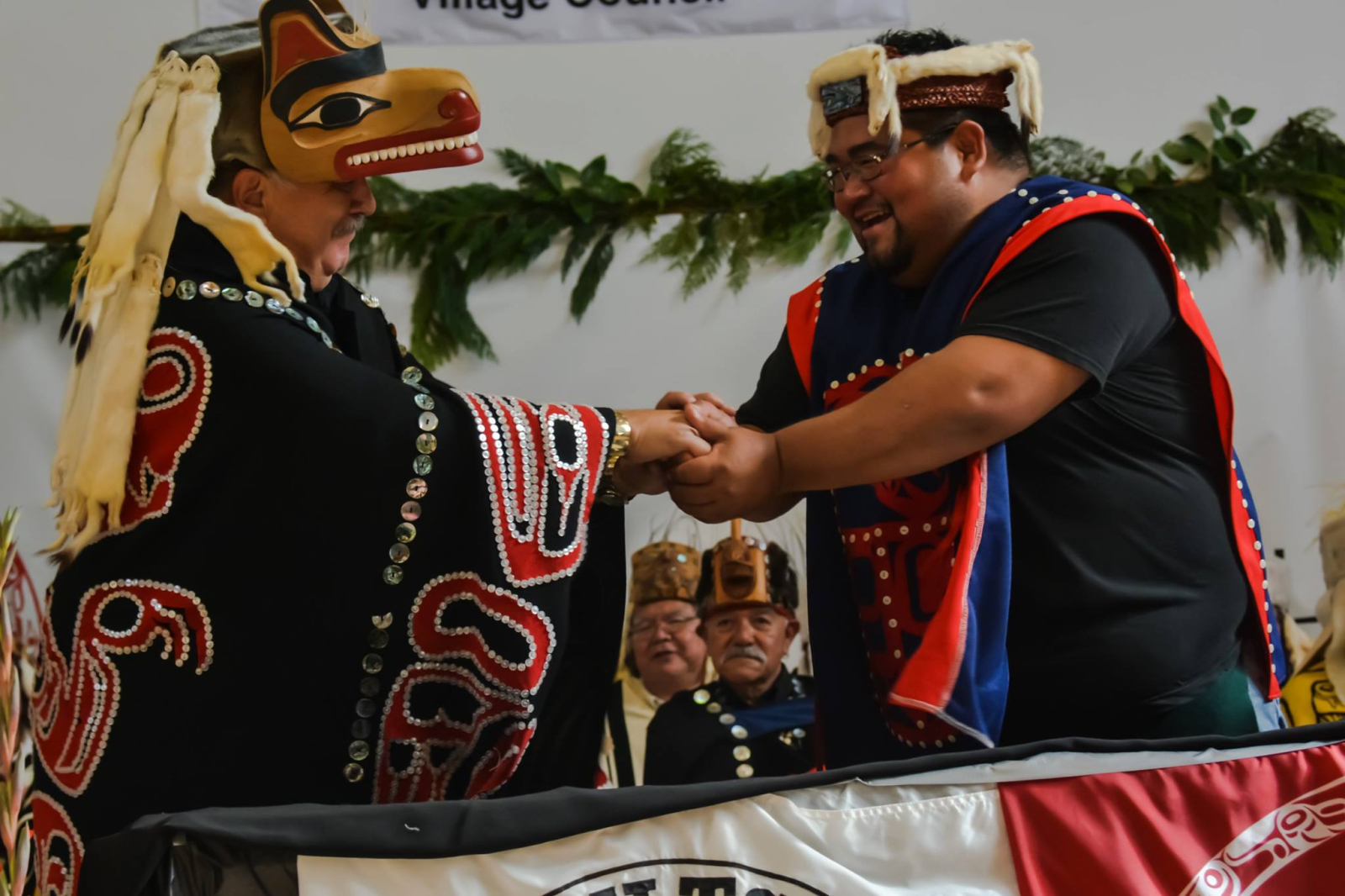
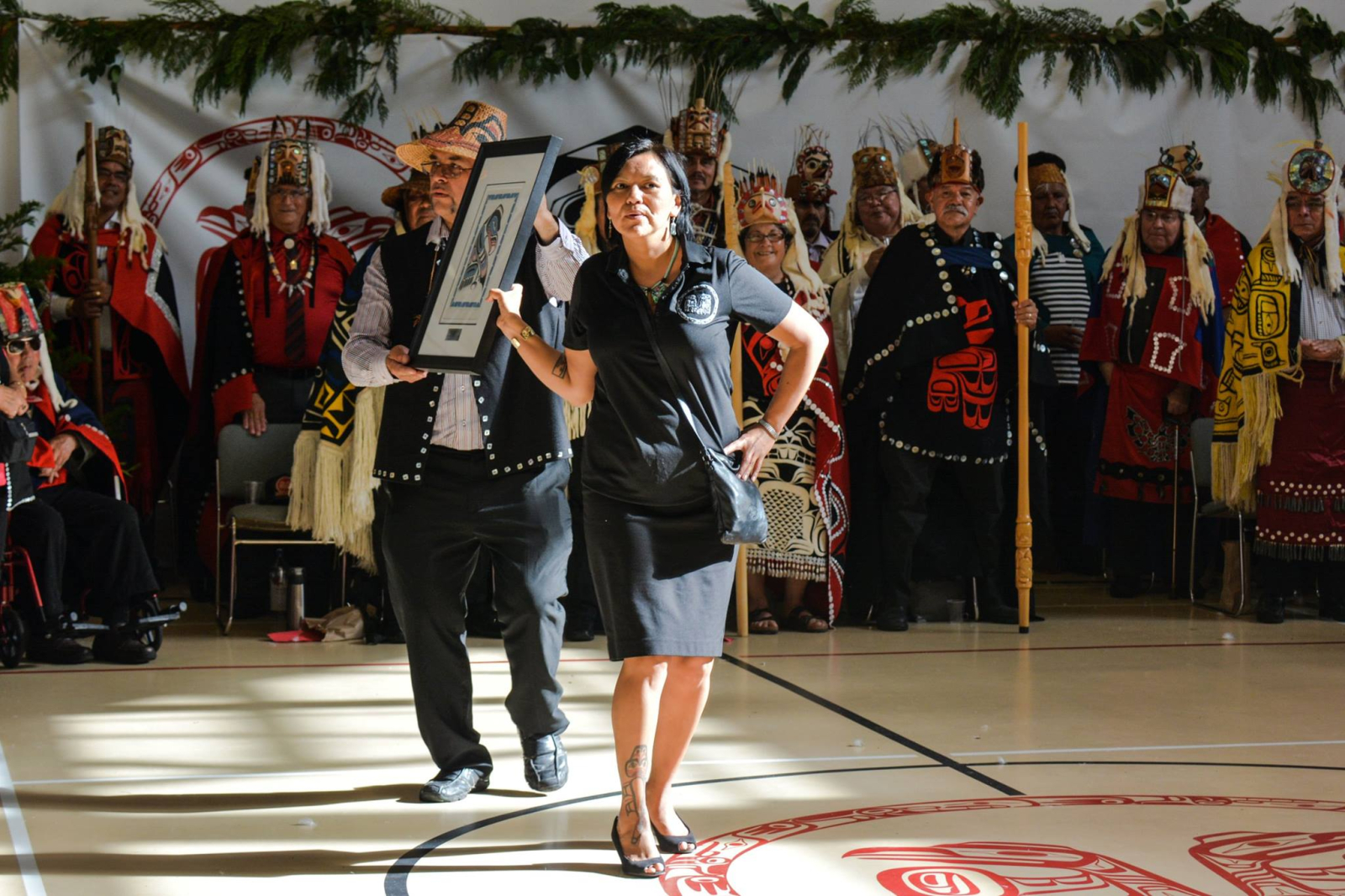
The historic treaty between the two nations recognizes a shared commitment to protect the land and water from extractive practices and projects. Both the Heiltsuk and Haida are marine people whose way of life and future generations depend on the well-being and proper management of their territories.
The Nations united to oppose the Northern Gateway pipeline, as well as the commercial fishing of herring in their territories.
At the time of the signing of the Treaty of Peace, Respect and Responsibility, Marilyn Slett, Chief Councilor of the Heiltsuk Nation, said it would strengthen political ties and build solidarity in environmental justice efforts.
Building relationships and sharing knowledge
Scroll down to continueSlett was one of the Heiltsuk women who attended the third dialogue session, held in Old Masset, Haida Gwaii last week.
It was the first time some of the women had seen each other since the the peace treaty signing in 2014 and 2015. Attendees of the women's session included Heiltsuk and Haida chiefs, elders, high-ranking women, youth, and council members from the Heiltsuk Tribal Council, the Council of the Haida Nation, the Old Masset Village Council and the Skidegate Band Council.
The days were themed: "Building Relationships and Sharing Knowledge" and "Taking Action and Creating Change."
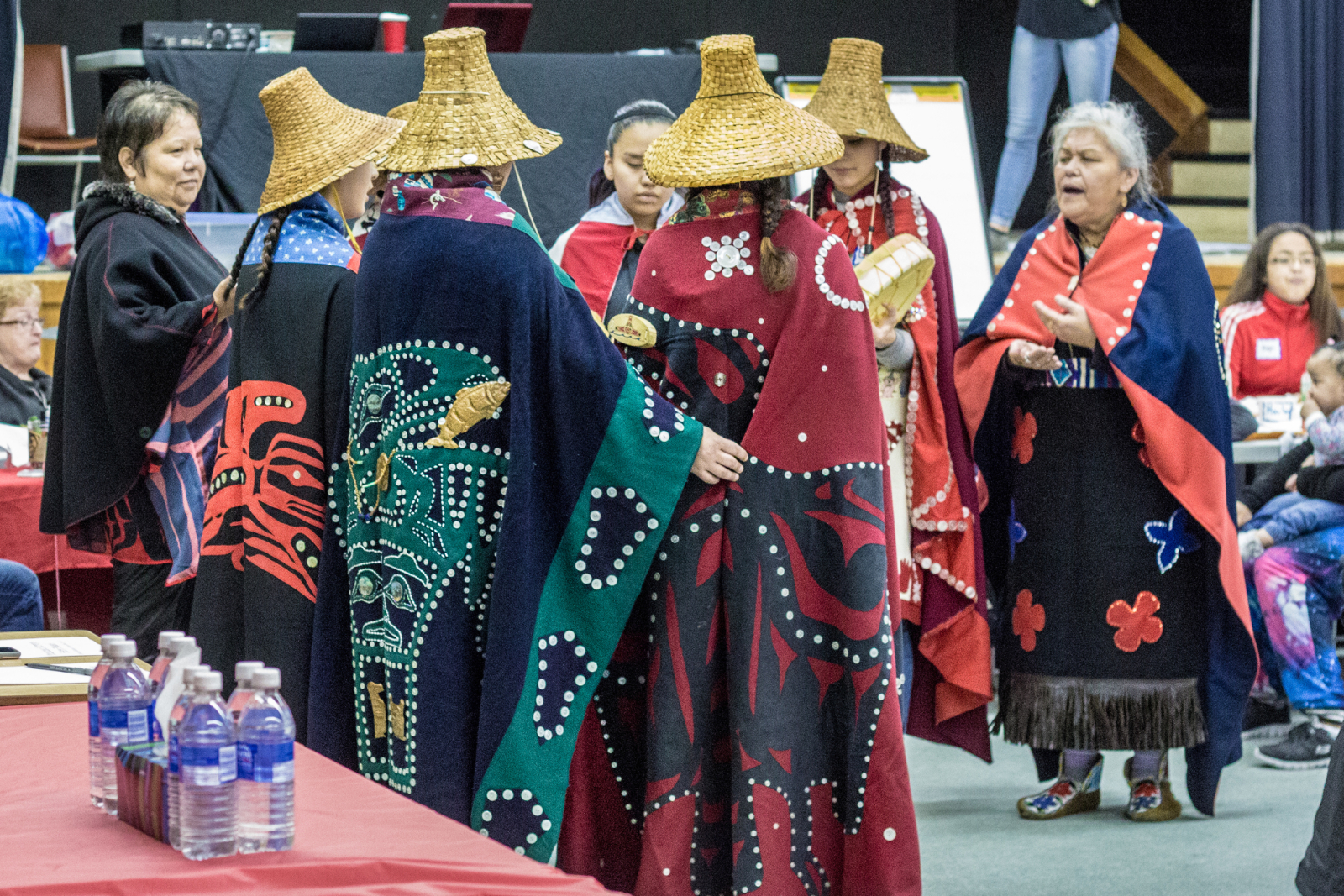
After an official welcoming, knowledge keepers from both the Haida and the Heiltsuk Nations shared their experiences and insights, on a panel discussion on cultural health and wellness. Connie Newman, Bella Brown, Liz Brown, Michelle Brown, Diane Brown, Pansy Collison, Gladys Vandal, and Leona Clow shared their stories and teachings. They spoke about their inherent connection to culture, respect for medicines and traditional foods, the importance of language, and relationship to land and territory.
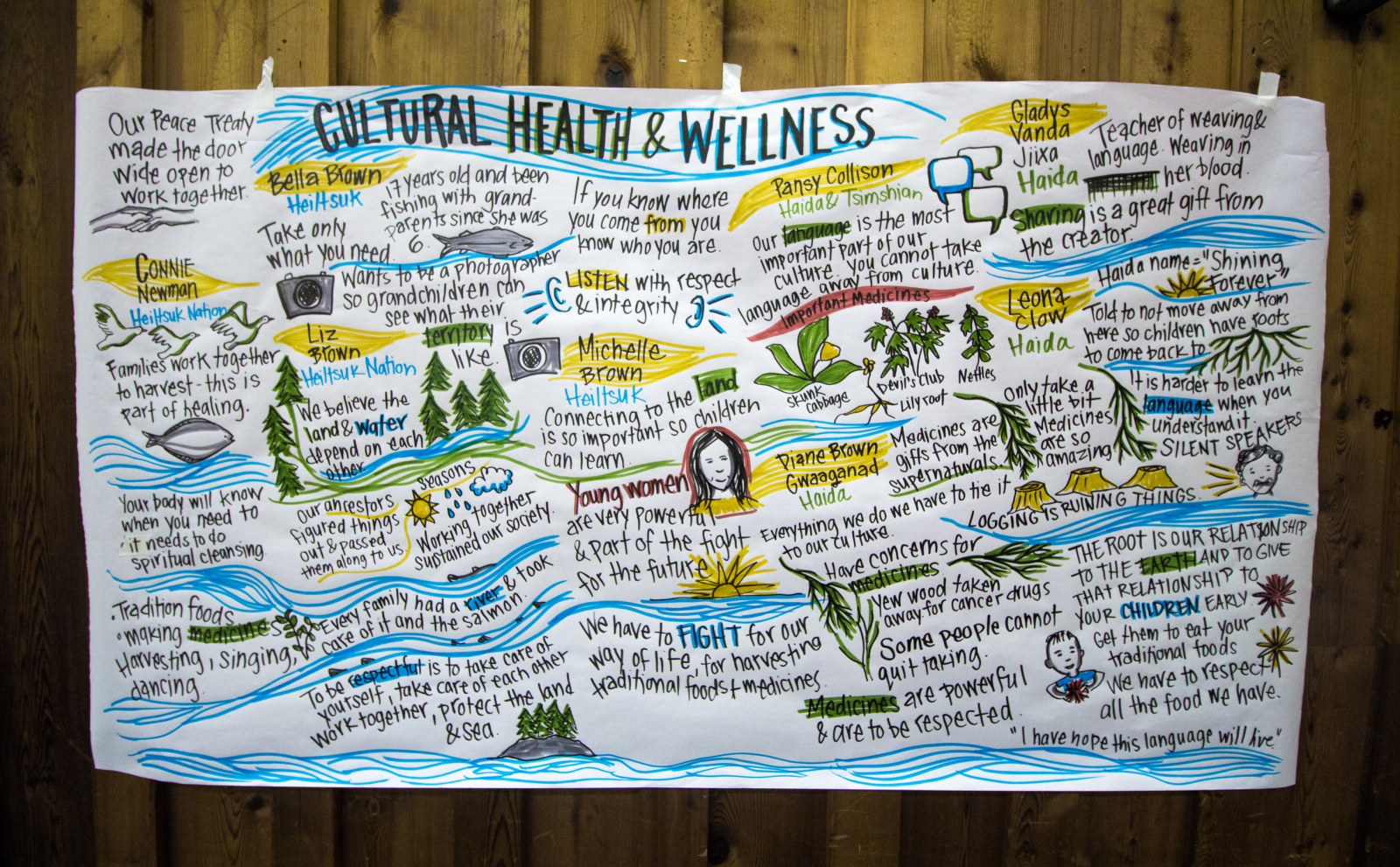
As a group activity, Haida and Heiltsuk participants were asked to address top challenges impacting their communities. Women, young and old, stood and shared their experiences, concerns and perspectives. 13 year-old Haana Edenshaw spoke her truth into the microphone.
"We want to learn more about our culture," she said. "We hear stories and we learn things as we go, but there's so much we don't know." Edenshaw echoed what other Haida and Heiltsuk youth brought up over the two days- a hunger to learn, know and do more.
Many of the women shared concerns they had for the world their children were growing up in- abuse, bullying, lateral violence and technology and safety were all issues raised. The topics were recorded and the women had a chance to vote on what they considered the most pressing issues, narrowing the list down to 13.
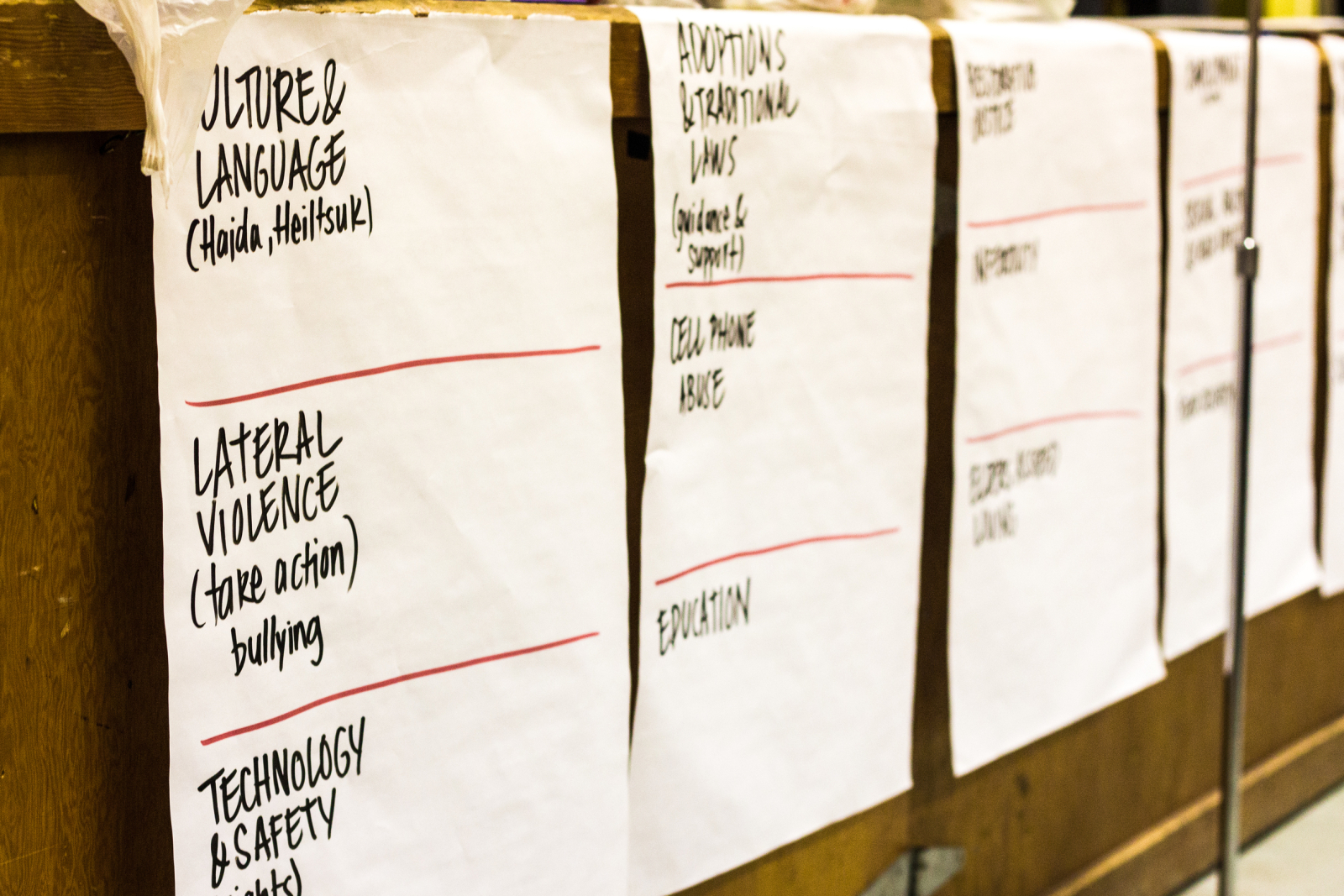
The women dissected the issues and brainstormed solutions. In the end, a representative from each table shared their insights and conversations- a powerful and emotional activity.
Throughout both days, tickets were called and prizes won. The group broke up heavier topics with games and activities, sharing stories and gifts. The Heiltsuk delegation brought bags and scarves for the Haida women and the Haida returned the gesture by handing the Heiltsuk women gift bags the following day. This was common protocol for two Nations known for their generosity.
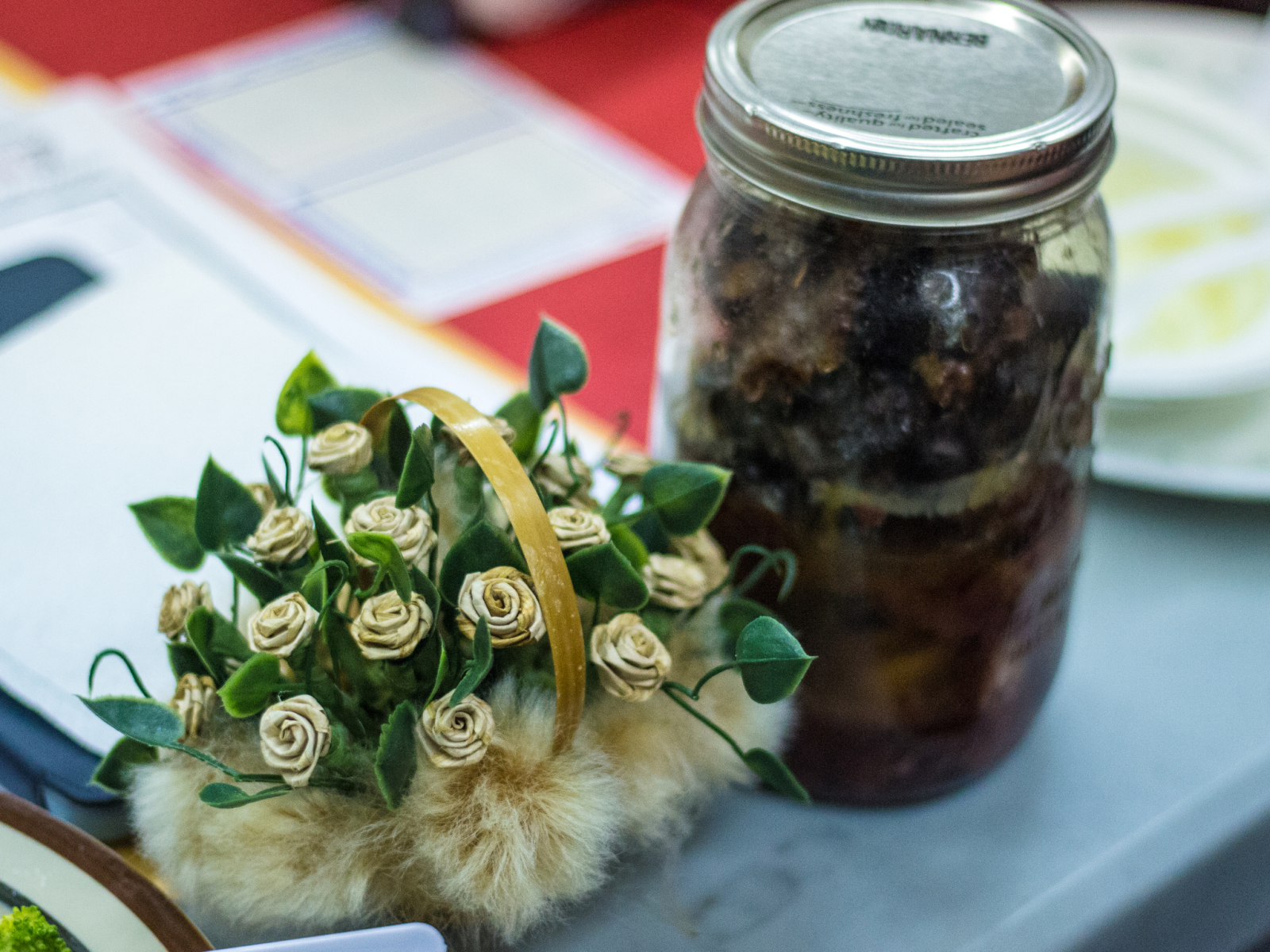
The participants of the dialogue session were asked to bring a small gift to exchange with a woman of the other Nation. Cedar roses and seaweed, beadwork and handmade soap were some of those gifts shared. Feb. 28, 2018. Photo by Emilee Gilpin.
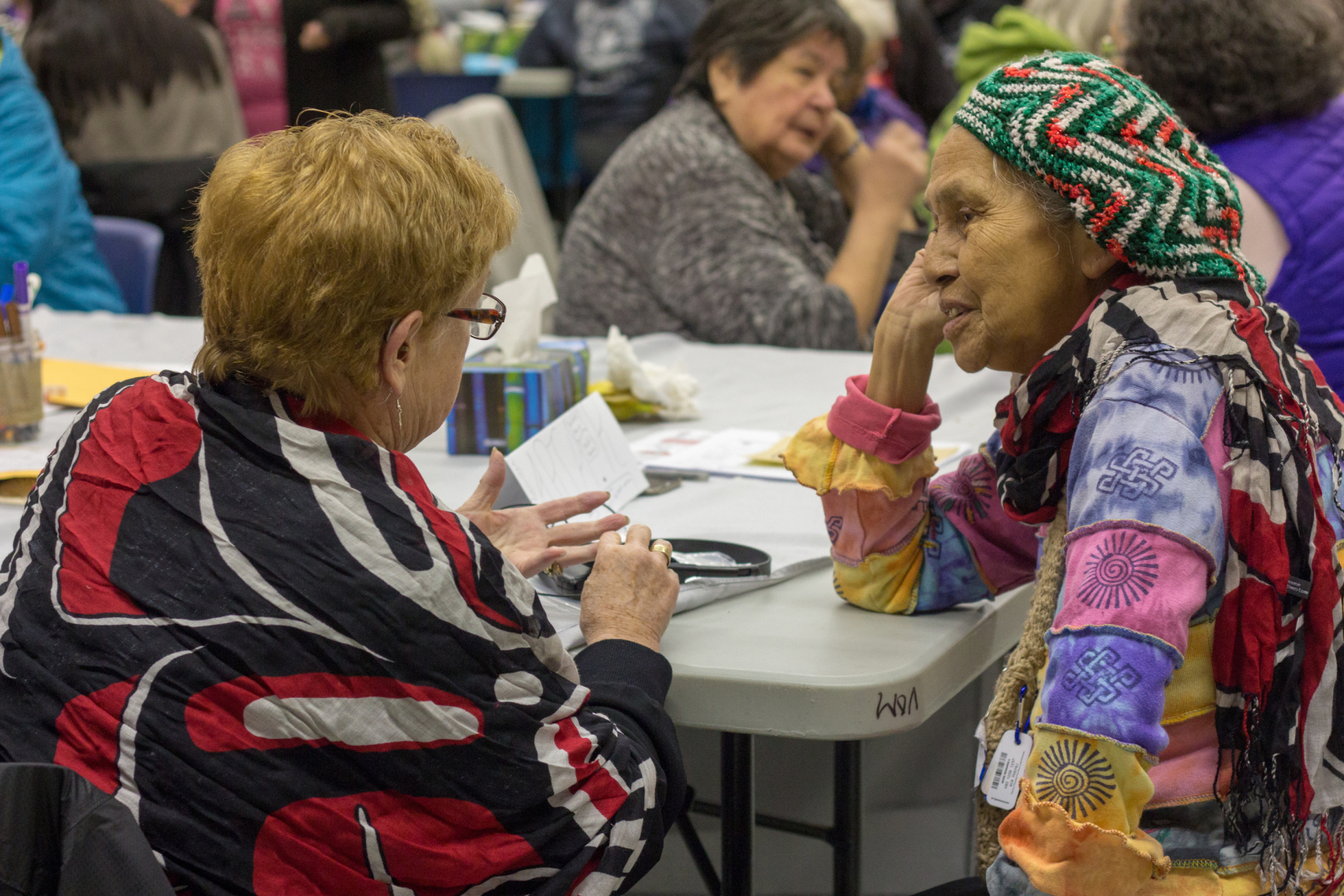
By the afternoon of the first day, the Heiltsuk delegation had received notice that an elder in the community had passed away. They exercised their leadership and ended the day early, calling off ceremonial dancing and singing planned for dinner at the Old Masset community hall later that night.
Some of the women took the break between the session and dinner, to drive to the beach in search of cockles. At dinner, some shared photos and videos they took. The ocean had served them a handful of cockles, which they smashed open, cleaned off and ate fresh- a treat for coastal women.
Taking action and creating change
Scroll down to continueThe second day welcomed a panel of female leaders who shared some of the environmental, social and political work they do.
Alix Goetzinger, Haida, 21 years-old, shared her experience dancing in the Haida dance group. She grew up in Haida Gwaii, dancing and singing in ceremony, and she came to understand it as a source of healing. Goetzinger spoke about the importance of cultural connection for the coming generations.
"When you dance, it's not just a hobby or activity you do for exercise," she said, "It's ceremony and you honour the sacred connection to the mask that you're dancing, the supernatural being that you're honouring and the story you're telling."
Goetzinger said it's her generation's responsibility- the 7th generation to be affected by colonialism and cultural genocide- to preserve their culture. She said they need to ask elders more questions and be prepared to deeply listen without distractions.
Adeana Young, Haida, spoke next. She is the deputy chief on the Old Masset Village Council. Young said good leaders listen. She told the group that she had heard many concerns raised over the two days of dialogue- from language to logging and everything in between.
"As an elected representative, being in a leadership role, one of the key abilities is being able to hear with open ears and understand what people are saying," she said. "I can hear you. I can speak with confidence about what concerns people have and what needs to be done."
Kathy Brown, Nuu-chah-nulth and Heiltsuk, spoke next. Brown is involved in an Aboriginal Ecotourism Training Program, a community-based program that brings First Nations students to different communities involved in Indigenous Ecotourism. The course is free for students, through an agreement between the Heiltsuk Tribal Council, Vancouver Island University and North Island College. The ecotourism program is currently training their third cohort- with 14 students from the Songhees and Salish people, all the way up the Central Coast.
Brown and her husband, Frank Brown were involved in some of the first tribal journeys, an annual canoe voyage of many Nations and communities across the Pacific Northwest. Brown said the ecotourism was a natural next step after seeing success of the tribal journeys. She spoke about how the ecotourism program and the tribal journeys instill pride and confidence in Indigenous youth. She spoke about the power and importance of (re)connecting young people to their culture.
Next, Jaskwaan Bedard, Haida, spoke about the work she has done to preserve and strengthen Xaad Kil (the Haida language), as a Haida language teacher and in Masset.
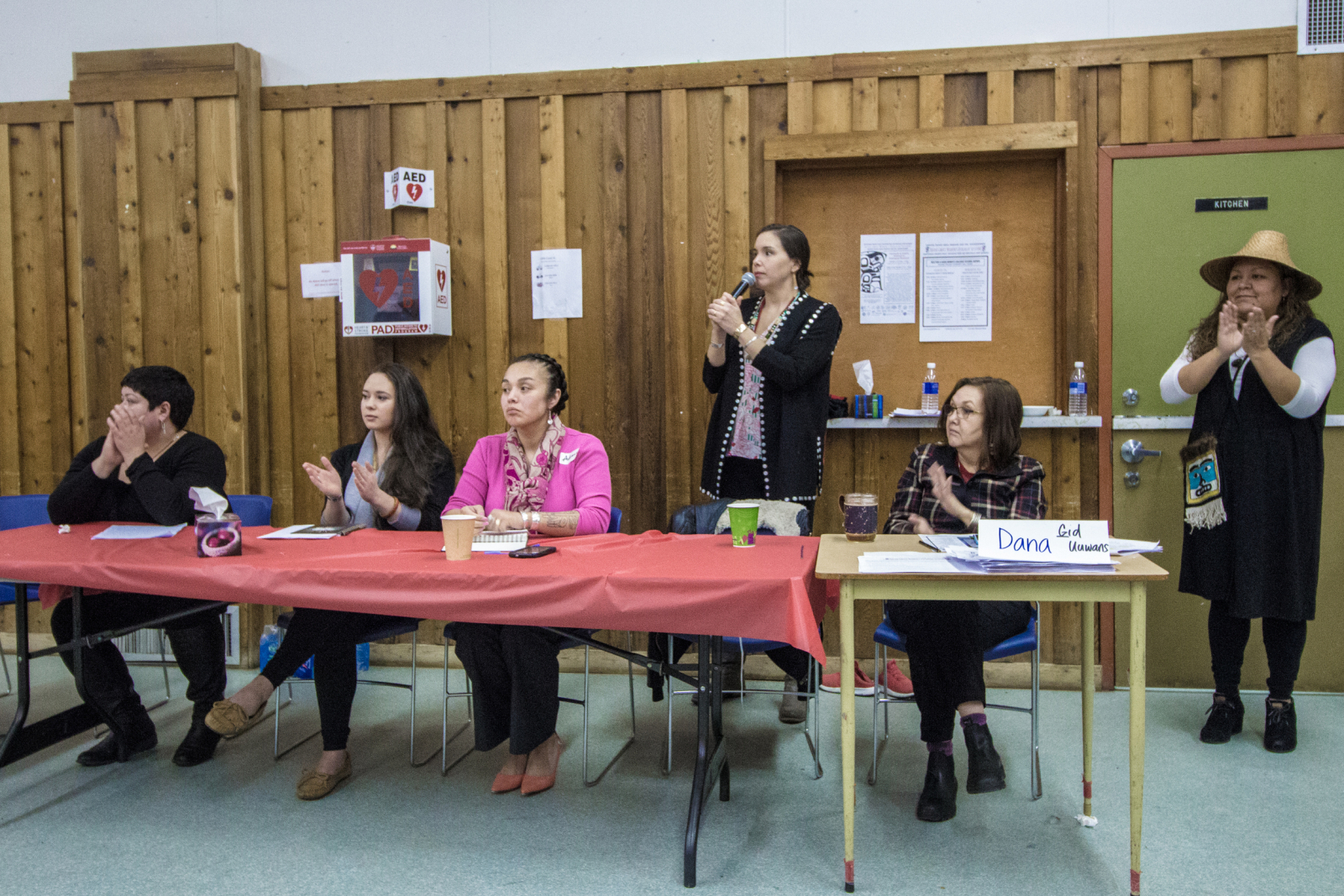
Bedard uplifted one of her mentors, Candace Weir-White, for inspiring her to learn the Haida language. Years ago, when Bedard first started to learn Haida, she heard White, a woman around her own age, speak Haida. She knew then that she could do it too. Bedard wants to inspire young Haida learners in the same way.
Bedard was a part of a large team working over many years, writing a curriculum package called the Integrated Resource Package, grades 5-12, for the school district. The document was approved by the Ministry of Education in March of 2017. It means students can learn the Haida language in school, to be recognized by Universities as a second language, an impetus for children to invest in the language, she said.
"I want to facilitate students to speak freely in the Haida language- not just an introduction or list of memorized phrases, but to be able to say what's in our hearts, in our language," Bedard said. "I know that can happen."
Pam Wilson, Heiltsuk, was the last to speak on the panel. Wilson attended the sessions with her mother and two daughters. Women in leadership, whether political or traditional, we are rising, she said, echoing a statement made many times over the two days.
Wilson said she had the blessing and the curse of being introduced to "good'ol Indian politics" at the age of 26, when she moved home from University, back to Bella Bella. She served a term as a councilor and was elected as Chief Councilor at the age of 28. Wilson said she couldn't believe the "insurmountable expectations of government and the many complex systems that control Indigenous communities, through the reservation system."
But Wilson said pressure comes from all sides for Indigenous leaders, including unreasonable expectations and dependency of the community they serve.
"I believe that as women, as life-givers, as mothers, there's a part in all of us that's the nurturer and the caregiver," she said. "As women, we inherently protect what's precious to us- our children, our communities, our passions. I also think women tend to be the social action doers. If there's a tougher issue to be dealt with, especially those situations that require us to talk about our feelings and our emotions, they're going to ask a woman to address that issue."
Wilson said Indigenous women take on some of the tougher issues in the community.
The Heiltsuk Tribal Council is comprised of 12 members, nine of which are women, with Chief Councilor Marilyn Slett moving into her tenth year. Wilson said today stands in stark contrast to when she first entered tribal politics. She remembered gathering at the BC Forum, as one of five women chiefs, standing among many men.
Wilson ended her presentation with advice for young women: "Speak from your heart, speak your truth. Stand up and be noticed, your contributions matter. Don't be afraid," she said, thinking of her daughters, hoping that today's hard work will make it easier for future generations of women. "No matter how challenging or maddening things get, lead with integrity. It doesn’t matter how talented, educated, rich or poor you are, at the end of the day, what you have left, is your integrity."
Women pave the way
Scroll down to continueBefore the second day came to a close, the Heiltsuk delegation shared the Heiltsuk Women's Declaration, a written document composed by a group of Heiltsuk women in 2015.
Megan Humchitt read the declaration through tears.
"We have the right to freedom from fear and shame, to healing, and to happiness," Humchitt said. "We are here through the strength of our family ties. We are here through the guidance of our Heiltsuk Gvi'ilas, the teachings that have sustained our people since the time of creation. We are here with the hands of our ancestors on our shoulders. We are here with future generations before us. We are sacred in mind, body, and spirit. We are women of integrity who are strengthened by our Heiltsuk culture."
The declaration, which in its totality outlines a number of rights and principles, is meant to "uplift the role of Heiltsuk granddaughters, grandmothers, mothers, aunties, sisters and nieces who make our nation rich," wrote Chief Councilor Marilyn Slett at the time it was released.
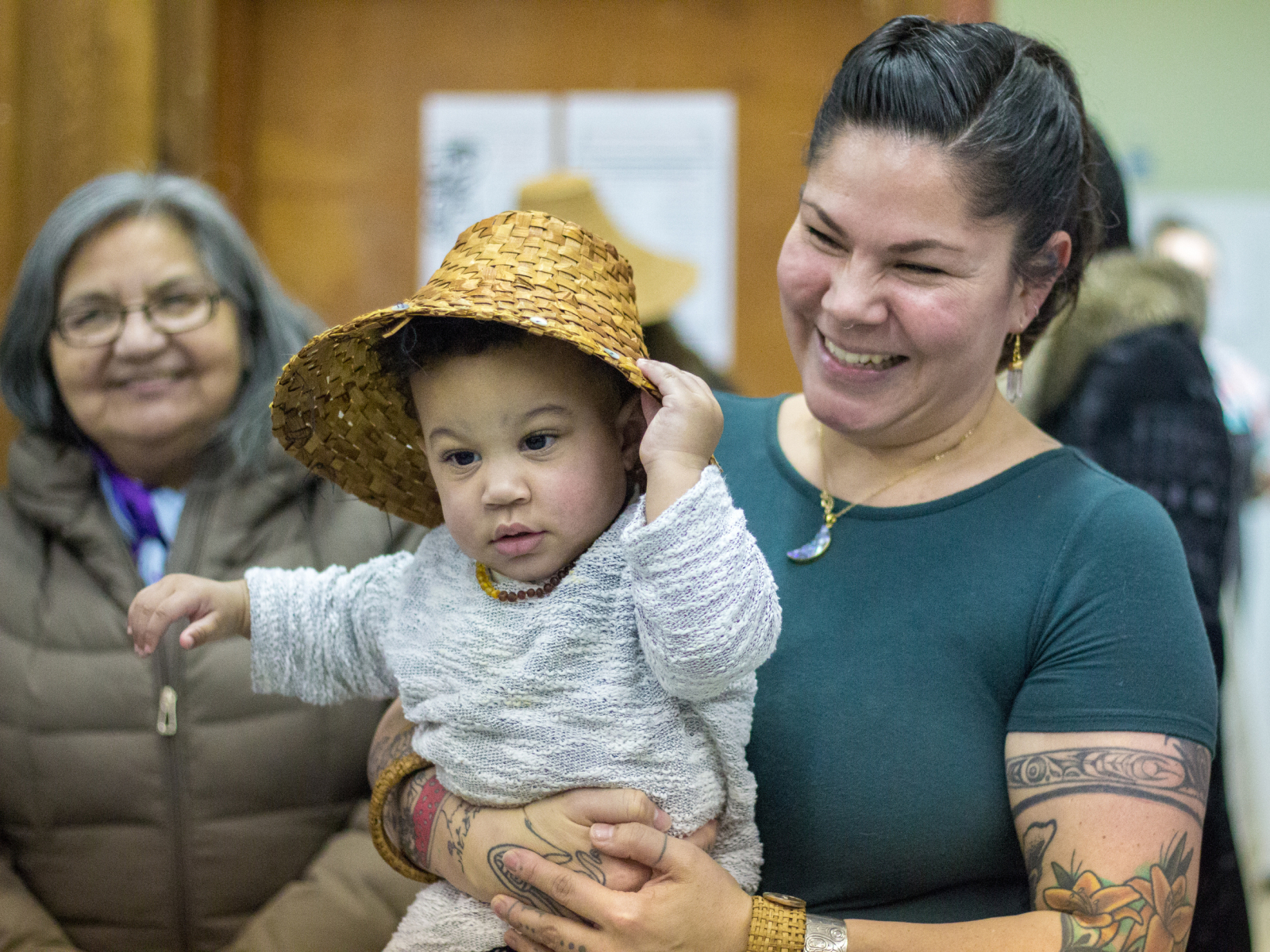
Raven Ann Potschka holds baby Tyler-Simone (one of her twins), who was gifted a cedar hat by the Heiltsuk women's group. The babies were very popular during the two days. Feb. 28, 2018. Photo by Emilee Gilpin.
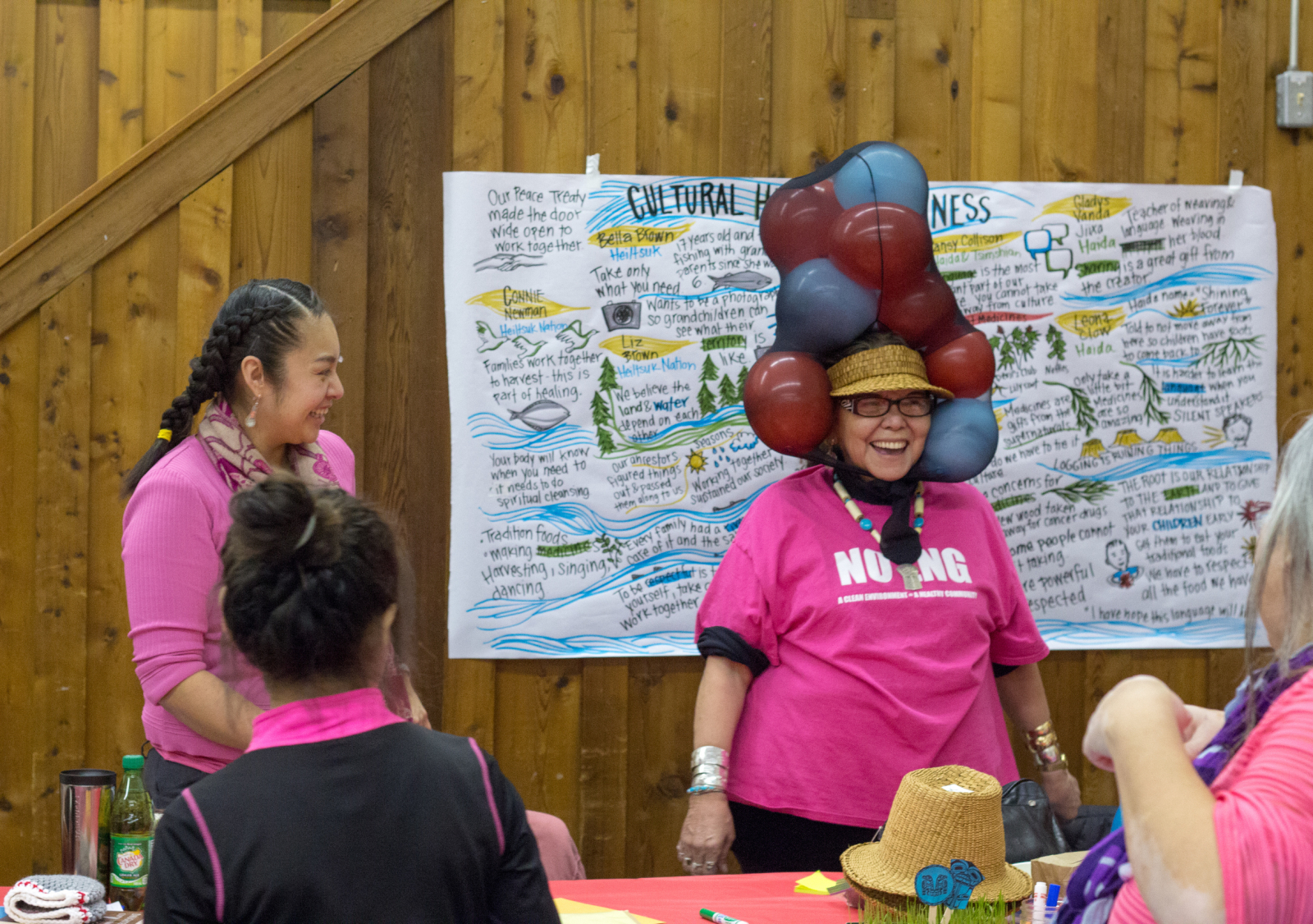
Adeana Young and Pansy Collison laugh during one of the group activities. Feb. 28, 2018. Photo by Emilee Gilpin.
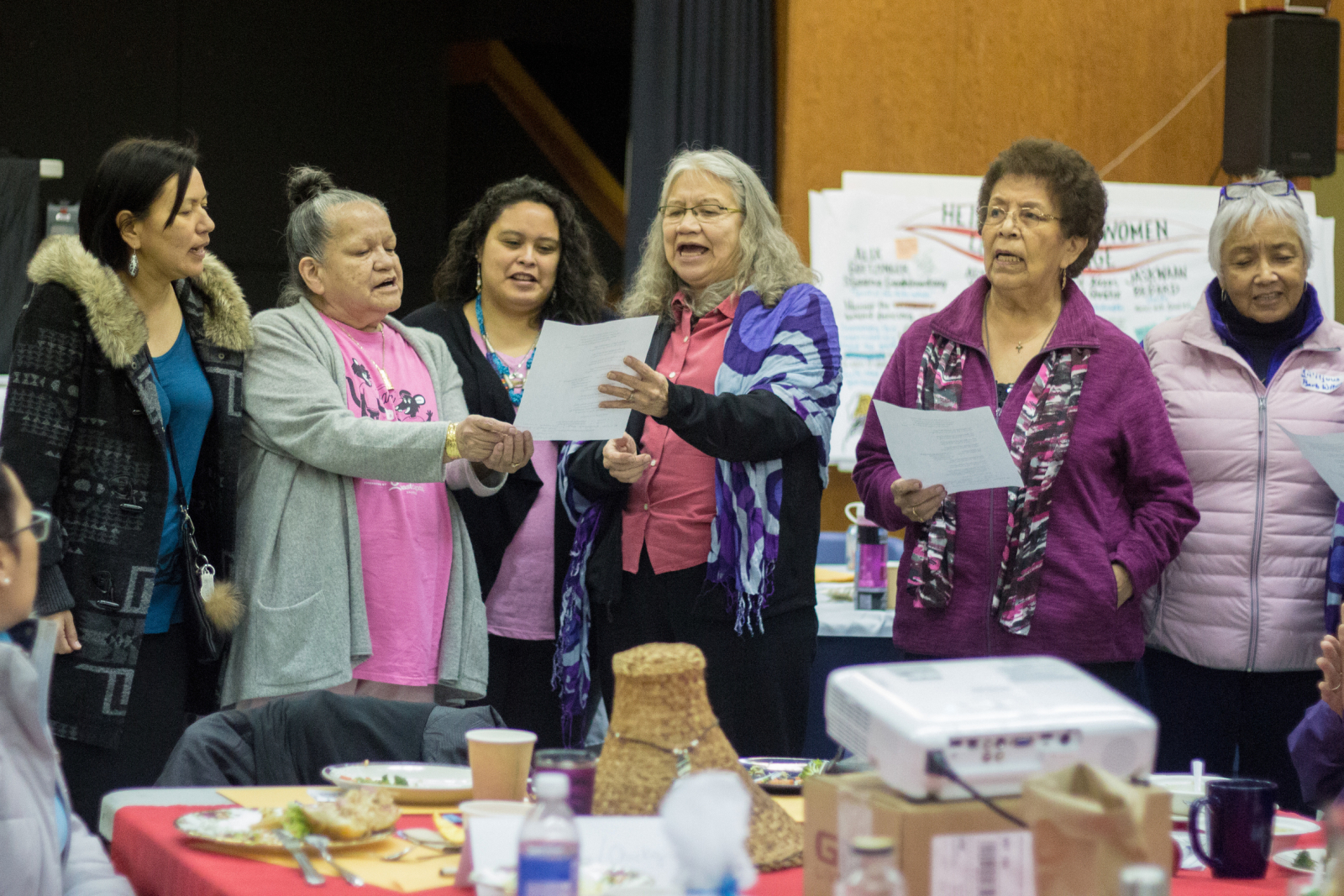
Part of the Haida delegation singing on the last day. Feb. 28, 2018. Photo by Emilee Gilpin
One of the key organizers of all three dialogue sessions, Rayne Tarasuik, said that the sessions wouldn't be possible without the support of the tribal councils and various funders. The sessions were funded by Indigenous and Northern Affairs Canada, Gwaii Trust, the Department of Justice Canada, and other smaller contributors.
Organziers invited cultural healers Merl Williams (Haida), Margo Sagalon, Violet Prince, Tracey Charlebois, and Barbara Lessard, from the Nak'azdi Whut'en First Nation and the Adah Dene Cultural Healing Centre, to offer their healing services to the women in attendance. Participants signed up and visited the women one by one. After the two days, organizers uplifted the women for their work and gifted them blankets.
As the second day came to an end, attendees had an opportunity to share their reflections. Speakers recognized the power of the gathering- a chance to recommit to coastal unity, to strengthen friendships, offer one another gifts and stories, and to feel empowered as a collective of Indigenous women.
The Heiltsuk delegation said they would plan another dialogue session in Bella Bella and participants left the hall with full hearts and hands.
First Nations Forward is being produced in collaboration with the Real Estate Foundation of BC, I-SEA, Vancouver Foundation, McConnell Foundation, Vancity, Catherine Donnelly Foundation, Willow Grove Foundation, and the Donner Canadian Foundation. National Observer retains full and final editorial control over the reporting process.
